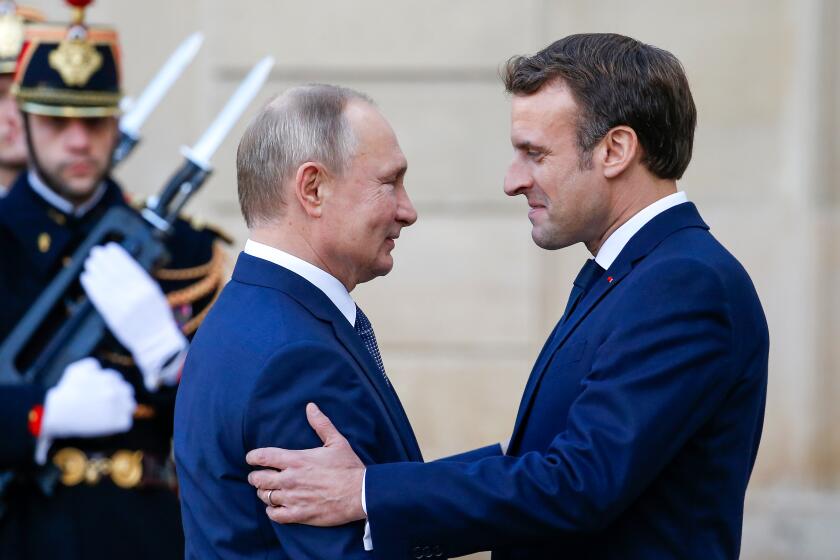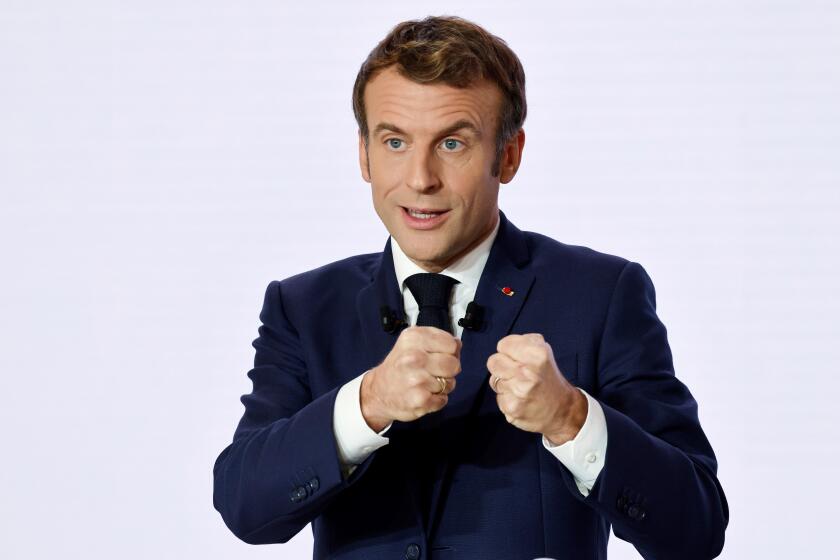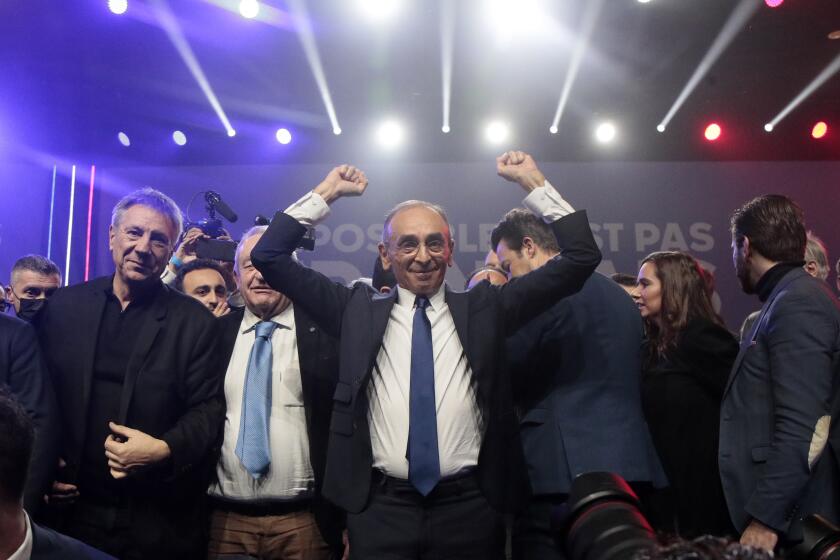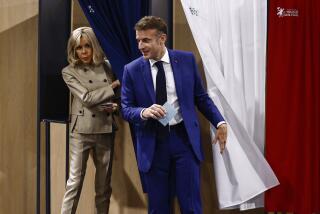Barely even campaigning, Macron leads the French presidential race
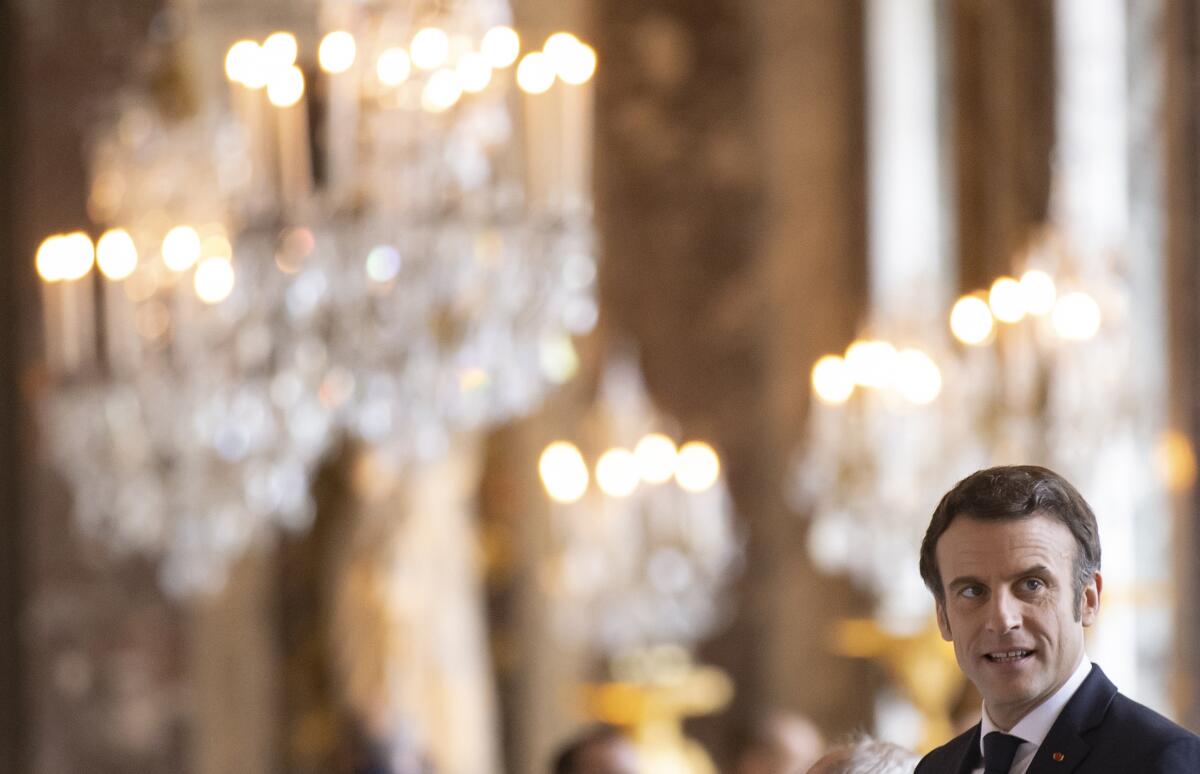
PARIS — Tired-looking. Unshaven. Wearing jeans and a hoodie. As he runs for reelection next month, French President Emmanuel Macron released unusual pictures of himself working nights and weekends at the Elysee palace, where he is spending most of his time focusing on the war in Ukraine — while avoiding traditional campaign activities.
If it’s a campaign strategy, it seems to be paying off, reinforcing his position as front-runner in the presidential race while making it difficult for other contenders to challenge him.
Macron was criticized by other candidates for refusing to take part in any televised debate before the first round of voting April 10.
He promised to answer journalists’ questions at length in a news conference Thursday afternoon — an effort to show he’s not avoiding difficult issues, his entourage said.
The centrist Macron is expected to unveil his proposals for the next five years, including a controversial pension change that would raise the retirement age from 62 to 65.
A government official involved in Macron’s campaign said the president wants to “respond to criticism. He will fully be campaigning” in the coming days.
The French leader has been a principal interlocutor of Russian President Vladimir Putin. He’s applauded for this engagement, but are his efforts bearing fruit?
Although he formally announced his candidacy at the beginning of the month, Macron has not held any rallies yet.
In recent days, he pushed for a cease-fire in Ukraine in phone calls with Russian President Vladimir Putin, and has spoken on an almost daily basis with Ukrainian President Volodymyr Zelensky.
Last week, he gathered European Union leaders at the glittery palace of Versailles, west of Paris, to discuss sanctions against Russia. France holds the rotating presidency of the European Union Council, which gives Macron a key role in coordinating the 27-nation bloc’s response.
Next week, he is expected to be seen alongside President Biden, who is coming to Brussels for a NATO summit.
French President Emmanuel Macron has provoked protests by using a vulgarity to describe his strategy for pressuring holdouts to get COVID-19 shots.
Pollster Bernard Sananes, president of poll institute Elabe, said that “obviously the international situation is reinforcing his stature.”
“It gives the impression that Macron in 2017 was elected on a promise to renew [politics] and that Macron in 2022 wants to be elected on the promise of [having] experience,” Sananes said in an interview with French newspaper L’Opinion. Polls show a majority of French people, whether they intend to vote for him or not, consider that he is up to the job, Sananes added.
Polls see Macron about 10 percentage points ahead of far-right contender Marine Le Pen, placing them both in a position to reach the runoff, in what would be a replay of the 2017 race. The polls show that, if that happens, Macron is widely expected to win.
Another far-right candidate, Eric Zemmour, the far-left politician Jean-Luc Melenchon and conservative contender Valerie Pecresse are other key challengers.
Far-right French presidential candidate Eric Zemmour has no problem embracing a phrase that evokes a conspiracy theory embraced by white supremacists.
Rivals have accused Macron of focusing on the situation in Ukraine to avoid speaking about domestic issues that might prove more tricky for him.
Le Pen said Macron is “using the war in Ukraine to scare French people, because he thinks scaring can benefit him.”
Advocates for Macron argue that the situation in Ukraine implicates key domestic issues in France that are being fully debated in the campaign, such as energy and defense policies.
Political historian Jean Garrigues noted the “unifying” effect a war-related situation can have around the head of state. He recalled that the same effect was noticeable when Macron’s predecessor, Francois Hollande, launched a military operation in Mali to drive Islamic extremists from power.
News Alerts
Get breaking news, investigations, analysis and more signature journalism from the Los Angeles Times in your inbox.
You may occasionally receive promotional content from the Los Angeles Times.
Before him, France’s greatest figures have proven their leadership in situations of war, from Napoleon to Charles de Gaulle. “French public opinion is very much rooted in that history,” Garrigues said.
“We can see that Macron’s adversaries have no experience equivalent to the presidential function, or even as key ministers, and are de facto in a situation of inferiority,” he noted.
Pollsters said Macron’s greatest challenge as the front-runner may be a low turnout, with supporters not going to the polls because they think he will win anyway, while those angry over his policies would further mobilize.
Macron himself acknowledged the risk in a behind-the-scenes video posted on his campaign’s YouTube channel. “That’s what I’m going to tell the French, and also my supporters: If they think it’s done, it means we have lost,” he said.
More to Read
Sign up for Essential California
The most important California stories and recommendations in your inbox every morning.
You may occasionally receive promotional content from the Los Angeles Times.
